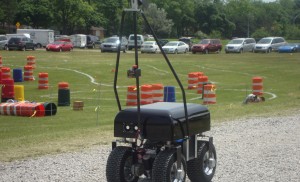Robot claims third

While it’s still a little ways off from creating the real-life version of Optimus Prime, the Oakland Robotics Association is helping create a new generation of autonomous technology right here on campus.
The team, a blend of 14 graduate and undergraduate students, is tasked with preparing an entry for the annual Intelligent Ground Vehicle Competition, held at OU.
This year, the competition was held June 3-6. Teams came from places such as Japan, Jordan and Canada. There were also schools present from the Ivy League and several other big engineering institutions, for a total of 40 teams. Prizes ranged from $100 to $25,000.
Botzilla, OU’s robot, took 1,500 man-hours to complete, according to team estimates. It was able to navigate obstacles and get to various locations on its own thanks to GPS, an on-board camera and navigation software programmed by the team.
In addition to the chance to compete, the team earned third place in two categories at this year’s competition, earning $3,000 for the robotics program. The team also took away practical application of the concepts they learned in the classroom.
KaC Cheok, the association adviser and OU engineering professor said this gives students “the ability to learn new things including technology and technical principles on their own, and apply the knowledge to design the robots.”
The group’s president, Micho Radovnikovich, a graduate student in his third year of the doctoral program in systems engineering, talked about the benefits of his time in the Association.
Radovnikovich said: “All the theory and mathematics you learn in class is nice, but if you don’t have a context for the real world implications of the math, then your knowledge is somewhat blunted. On top of that, the experience gained in a group such as this gives you the programming and/or construction skills that any industrial engineering job would require.”
Although performing well at IGVC is the group’s main objective, they attend other competitions in order to practice with and fine tune the robot.
Vice President Lincoln Lorenz, in his first year of a Ph.D. in electrical and computer engineering, said he enjoys the challenge.
“There are a wealth of things that I get out of being a member of the robotics team,” he said, “work experience, friends for a lifetime, the knowledge that I can work in high pressure situations, and getting to work with a motivated team.”
One of the biggest challenges the team faces is figuring out what is feasible to put into the robot given challenging time constraints.
Radovnikovich said the team is constantly asking itself questions.
“What type of control hardware should we use?” he said. “Would it take too long to develop the software? If so, what alternatives do we have? Answering these questions and coming up with attack plans months ahead of time is sometimes harder than the actual engineering.”
Radovnikovich said all the work shows in the finished product.
“The best part of being with ORA is that we get to participate in the ever-expanding field of autonomous robotics,” he said. “It is a very exciting field, and when you walk into the tent at IGVC with a vehicle that turns heads and performs well, you get the enjoyable feeling of seeing your hard work pay off.”



